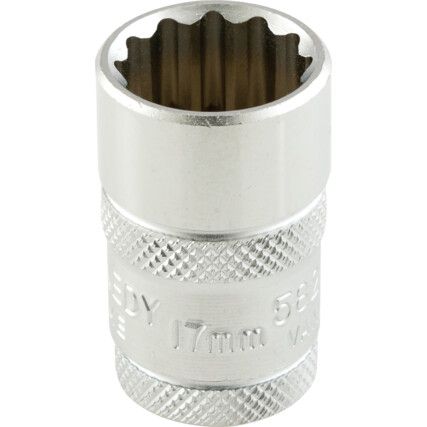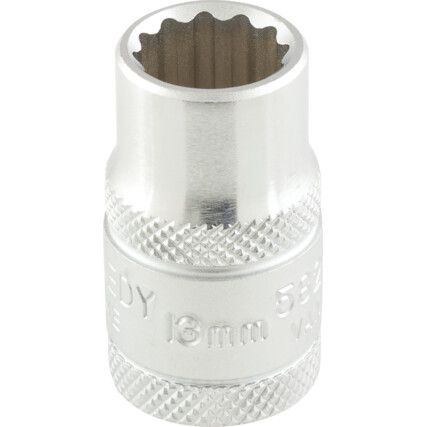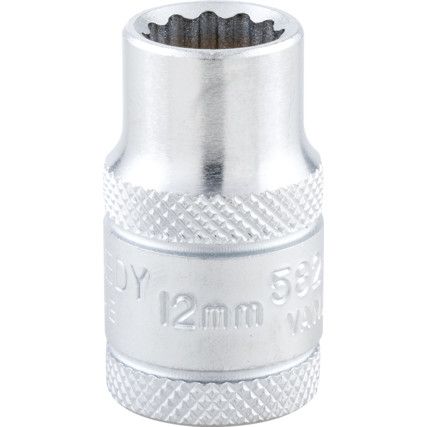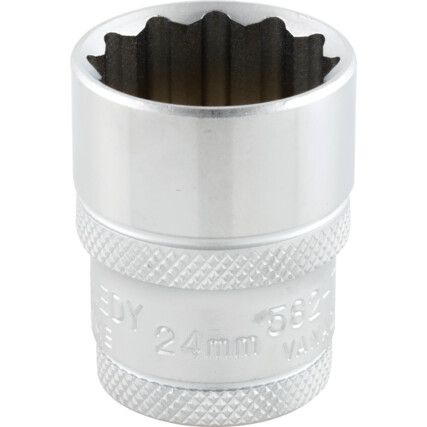Sockets
Sockets, also known as hex sockets, are a vital piece of equipment used to tighten and loosen nut and bolt fastenings. Here at Cromwell, we stock a vast range of sockets from leading suppliers Kennedy-Pro, Yamato, Kengrip, Kennedy and Facom.
What are sockets?
Sockets are a tool that attaches to a turning tools such as a socket wrench, torque wrench, or ratchet to loosen or tighten nut or bolt type fasteners by turning it. The most common socket head shape is a hexagon, known as a hex socket or 6 point sockets.
Why sockets?
Sockets are designed to have a recessed square at one end named the drive socket which is used to connect the socket to a turning tool. At the other end of the socket, it is called the head. The socket head can be a variety of different shapes and sizes dependent on the specific type and size of fastener it is designed for. Sockets are made from high-quality materials to ensure durability and strength.
Sockets require less material to produce than a complete spanner and are easier to carry and store. They are widely available as a socket sets allowing you to have a complete range of sizes with you at all times to suit all your tooling needs.
When are sockets used?
Sockets are mainly used in conjunction with turning tools and have many advantage to using other fastening tools such as a spanner or a drill which makes more torque leverage to make tightening and loosening fixings easier and quicker.
Sockets are used in a wide range of industries and applications. Most commonly found in the automotive industry but also in aerospace, civil engineering, marine maintenance and construction industries, but also in domestic environments.
Socket types
There are two main classifications of sockets, standard socket and impact sockets. These can then be further classified. Below, the most common types are listed and explained to help you shop our range with confidence.
• Standard sockets - Also known as non-impact sockets . They are commonly made from steel alloy.
• Impact sockets - Stronger and manages torque impact changes easier than a standard socket. It is often made from drop forged also known as hardened carbonized surface or heat-treated materials.
• Hex sockets - These are hexagonal shape and consist of 6-points.
• Double hex (bi-hex socket) - A hexagonal shape socket consisting of 12-points.
• Deep sockets (deep dive sockets) - These sockets are longer in length than standard sockets. This allows for easier accessibility to hard to reach places and the deep barrel design allows them to reach bolts that are recessed.
Considerations when choosing a socket
• Size - Sockets are available in a wide range of sizes. It is crucial to ensure the socket size matches the size of the tool and the size of the bolt or nut to avoid damaging the machine or socket.
• Socket type - The sockets type selection should be driven by the intended fixing you are using, commonly a hex, double hex, torx, and deep type.
• Size system - Sockets are available in metric, imperial, torx and whitworth units of measure.
Sockets jargon buster
Here at Cromwell, we want to make sure you make an informed purchasing decision, so we've outlined some key terms relating to sockets, making it easier for you to shop our range.
What is the Whitworth thread measuring system and where is it used?
A socket with a Whitworth thread simply means that it uses the pre-established standards that were first devised by Joseph Whitworth in 1841, which later became known as the British Standard Whitworth (BSW). Fastneners with a Whitworth thread are defined by some key characteristics: a 55° thread angle, a thread depth of 0.640327p and a radius of 0.137329p, where p is the pitch of the fastener.
Whitworth threaded sockets and fasteners are widely used in the marine industry.
FAQs
Why is it called a drive socket?
It is named the drive socket because it is the end that is being driven by the turning tool.
What is the most commons size of socket?
The most commonly used sizes of sockets include 10mm and 36mm sockets.










